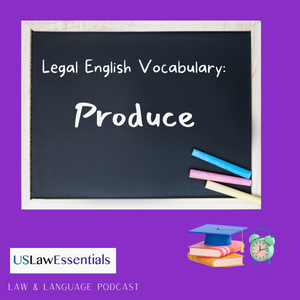Episode Transcript
Speaker 0 00:00:00 Welcome to the U S law essentials law and language podcast, the legal English podcast for non-native English speakers. That helps you improve your English, listening, improve your legal English vocabulary and build your knowledge of American legal culture.
Speaker 1 00:00:17 All the honorable.
Speaker 2 00:00:21 Welcome to the U S law essentials law and language podcast. I'm Daniel Edelson
Speaker 3 00:00:27 And I'm Steven Horowitz. And today we continue the what's new in the legal news series. And today it's, Dan's turn to pick a topic. Dan, what did you pick for us?
Speaker 2 00:00:39 The topic I picked is a continuation of something that we've already discussed. The Sarah Pailin defamation trial and the article is headlined a judge's unusual timing may keep Sarah Halen's legal hopes alive. And as usual, we have a link to the article in the show notes.
Speaker 3 00:01:05 Huh? So there's a judge and they have unusual timing who who's the judge,
Speaker 2 00:01:13 The judge, the judge is actually very well known. His name is judge Rakoff, and this is the judge who rendered the decision. He gave the decision that dismissed Sarah Halen's defamation lawsuit against the New York times.
Speaker 3 00:01:35 Wait a second. He dismissed it, but wasn't wasn't this a jury trial.
Speaker 2 00:01:40 It was, it was one interesting thing about us. Civil litigation is unlike the movies where you have a trial, right? And then it goes to the jury and then everybody waits for the jury's decision. Frequently, a judge will give a decision that will end the case.
Speaker 3 00:02:03 So, so a lot of times it doesn't actually go to the jury.
Speaker 2 00:02:08 That's right. And under the federal rules and there's similar rules in state court, there are certain points where a judge can decide, all right, this case, this case is over. So for example, at the very beginning of a litigation, a judge could say, okay, I have to dismiss this case. I have to terminate this case either because I don't have power over one of the parties. Maybe this case was brought in the wrong court, or it's clear that this case is meritless.
Speaker 3 00:02:44 And by meritless you mean
Speaker 2 00:02:46 It mean that there's no legal or factual basis for, for the allegations.
Speaker 3 00:02:52 So like, if I filed a lawsuit against you saying Dan, I don't like your voice and I'm you for a million dollars. Would that be meritless?
Speaker 2 00:03:03 Well, a lot of people would agree with you, but yeah, you wouldn't have a legal cause of action against me. You would just have, you would just have to live with it. Like you live with it every week.
Speaker 3 00:03:13 So wait, wait, I have another question. So a judge can just do this on their own.
Speaker 2 00:03:17 Sometimes a judge will do it on his own, but frequently it's in response to a motion, a request from a party for a legal decision.
Speaker 3 00:03:27 Okay.
Speaker 2 00:03:28 So for example, if you sued me because you didn't like my voice, I would ask, I would move the court to dismiss your complaint saying even if I have a terrible voice, you can't Sue me for having,
Speaker 3 00:03:40 You would move the court. Like you would pick up the court and move it.
Speaker 2 00:03:44 If I, if I had that ability, I maybe I would, but a motion is a request to a court for a legal decision. So,
Speaker 3 00:03:52 Oh, so move is the verb form of, of the now in motion
Speaker 2 00:03:57 And the party that makes the motion is a movement.
Speaker 3 00:04:00 Wow. Like M O V a N T a movement. Right? So if it, if I'm the court, the one being moved, am I a movie?
Speaker 2 00:04:09 No, but if you're the party opposing the motion, you're the non-movement.
Speaker 3 00:04:14 Oh, so there's the movement and the non-movement, but there's no movie. Although this case, they might make a movie about it
Speaker 2 00:04:20 And they, they could, they could make a movie out of it, but,
Speaker 3 00:04:23 But that's not a legal term.
Speaker 2 00:04:26 I don't believe so. I don't believe so.
Speaker 3 00:04:29 Okay. So, so now, so one party makes a motion and a judge can grant or deny that motion.
Speaker 2 00:04:38 So it's interesting you bring this up because, you know, in the examples that we gave were there, there was a meritless lawsuit. We would expect the, the case will be dismissed really early on. But this decision actually came very, very late in the case,
Speaker 3 00:04:56 Like just before it was given to the jury to deliberate and make a decision.
Speaker 2 00:05:01 Yeah, exactly. This is a rule 50 motion, often known as judgment emotion for judgment as a matter of law. And this is a motion that can be brought during a trial up until the point where the jury is asked to make a decision.
Speaker 3 00:05:23 So, and I'm assuming judgment as a matter of law means the jury decides the facts. So if the judge is making the decision, they're saying, they're making a decision based on the law and not necessarily based on the facts, is that correct?
Speaker 2 00:05:40 The judge says, okay, I know the law. And now you've presented all the, all the facts that you want to present to the jury. You've presented all the facts during this trial, but I can look at these facts and I know the law, and I realize that there is only one acceptable decision as a result of this. So one side has to win based on the, based on these facts and based on the law.
Speaker 3 00:06:15 So in this case involving defamation, the standard as we discussed in our previous episode is actual malice. And the judge looks at the facts and says, well, Ms Pailin you showed that these guys made a really bad mistake, but you didn't show that they did it on purpose or with malice.
Speaker 2 00:06:35 Yeah. And that's exactly what happened. Judge Rakoff said, all right, given these facts, there's no way that Sarah Pailin has shown that the New York times knew or was reckless and not knowing that the statements that they made about her were false. In other words, it was just a mistake.
Speaker 3 00:06:59 But then the headline of this article says a judge's unusual timing. What's that about?
Speaker 2 00:07:04 Well, this, this is what makes it really, really interesting. So the New York times, the New York times makes it's rule 50 motion asking for judgment. As a matter of law, judge Rakoff doesn't make a decision quickly. And he says to the jury, okay, go ahead. You decide whether or not you think the New York times should win, or Sarah Pailin should win so far. So good.
Speaker 3 00:07:35 Okay, good. So it's so the judge says, oh, I'm not gonna, I'm not going to deal with that motion right now. Okay. Jury, start talking about the case and we'll give you a little time to make a decision,
Speaker 2 00:07:47 Right? So the jury is sitting in it's room it's and they're deliberating. They're discussing whether Sarah Pailin should win or the New York times should win.
Speaker 3 00:07:56 And when they're in this and Dan, when they're in this room, do they have TVs? What, like, how do they have access to information from the outside world?
Speaker 2 00:08:08 Well, they're supposed to be, I guess the word is sequestered and they're not supposed to be receiving theirs. They're not supposed to be following the news. They're supposed to only be focusing on their deliberation and not listening to reporters and other commentators.
Speaker 3 00:08:27 Okay. So
Speaker 2 00:08:28 They're in this room, right? Yeah. And they're supposed to be sequestered. Then judge Rakoff calls in the parties that he calls and Sarah Palin's lawyers and the New York times lawyers, and this is of course public. And he says, I'm going to grant the New York times. The New York times is rule 50 motion. I'm going to, I'm going to give judgment as a matter of law in favor of the New York times,
Speaker 3 00:08:58 He did this while the jury was deliberating.
Speaker 2 00:09:01 Yeah. And, and he didn't tell the jury, he just said, I'm going to let the jury go ahead and reach any decision they want, but I'm granting, I'm granting this motion in favor of the New York times.
Speaker 3 00:09:21 So, so normally a judge might grant this judgment as a matter of law at the end of the case, before it goes to the jury and then the jury doesn't have to do anything.
Speaker 2 00:09:35 Yeah. The jury can just, you know, if that is the case, a jury can just go home.
Speaker 3 00:09:39 Or the judge, the judge could wait until the jury has finished deliberating and gives it to verdict. And then if the judge doesn't like the decision or disagrees with the decision, the judge could give a judgment as a matter of law and say, well, the jury found in favor of the plaintiff, but I think that's the wrong decision because it did, there's no way this could meet the standard of the law.
Speaker 2 00:10:05 Yeah. And there's another procedure called rule 59 where a party can make a motion after, after the jury trial. But yeah, I think, I think, I think the general idea is we would expect the judge to quickly give his decision and, and just save the jury at the time of having to, um, deliberate.
Speaker 3 00:10:27 So th so the really unusual part is that the judge Ray cuff did it while the jury was deliberating. And do we know why judge Rakoff did it like this?
Speaker 2 00:10:38 Yeah. He had his, he had his reasoning. His idea was, well, I figured this is going to go on appeal anyway, this way, when it goes up on appeal, the appellate court can see what I decided, and it can look at what the jury decided and it, and this way there'll be, um, really complete information for the appellate court, but something went wrong.
Speaker 3 00:11:01 Okay. Uh, sounds like a good plan. I, what could go wrong?
Speaker 2 00:11:05 Well, apparently, um, what the judge didn't realize was, um, everyone has cell phones and people get push notifications. You know, like when that little BP goes up on your, on your phone, when there's important news,
Speaker 3 00:11:23 Oh, I hate that.
Speaker 2 00:11:24 You don't like that.
Speaker 3 00:11:26 I don't like it. Yeah. Apple, my iPhone is always just giving me things and they, they're not important
Speaker 2 00:11:32 Before you can change the settings. But anyway, but, but here I, what happened was the jury was sitting there, deliberating judge Rakoff thinks he's telling the rest of the world what his decision is and that, and he thinks the jury won't know. But then the jury members, they're all sitting there with their cell phones and at least a couple of them get these push notifications saying, oh, judge Minkoff, just dismissed the plaintiff's case. So the New York times wins.
Speaker 3 00:12:06 Huh. Now, Dan, have you ever been on a jury before?
Speaker 2 00:12:10 No, I, um, I was, I've had to report to court to see if I would be on a jury, but I've never been selected to be on a jury. Have you ever been on a jury?
Speaker 3 00:12:21 Yeah, I was on a jury one time and I'm trying to think what, what would it be like? And when I was on a jury, it was before everybody had iPhones. But if I got a notification like that, about what the judge had said, I think that would affect me in some way.
Speaker 2 00:12:38 Well, that might be the basis to argue that, um, judge Rakoff made a mistake that maybe this would somehow have influence the jury in terms of its in terms of its decision-making. I know I would have felt like, oh, I guess, I guess it's time to go home because I wouldn't really have understood this idea of oh, the judge gave a decision, but no, no, no. The jury should still keep on deliberating. It seems a little bit counter a bit counter intuitive.
Speaker 3 00:13:16 Yeah. And I guess the timing of the pop-up notification might matter, like maybe the jury had already made its decision. Like everybody kind of knew where they were going and then the D and then the pop-up came or maybe they were still in discussion and debate and trying to persuade a couple people that this is the right decision. And, and then the pop-up came in which case it might've affected how people saw it.
Speaker 2 00:13:40 Yeah. I mean, I suppose you know, that it is sort of, it, it is interesting, but I guess, um, for people studying us law, one of the takeaways from this is everyone knows that we, we study case law to learn, to learn law in a U S law school. But it's also helpful to realize that judges can terminate cases or choose not to end cases at various points during a civil litigation. And it's those decisions that are frequently the subject of an appeal. And that's where a lot of case law comes from.
Speaker 3 00:14:21 Yeah. So it's, it's not an appeal about what the jury decided it's about. It's an appeal often, or usually it's an appeal generally about a decision the judge made during a case whether to grant one of these motions or to allow certain evidence or to not allow certain evidence so that when it goes to the appellate level, it's, it's a decision about the law.
Speaker 2 00:14:45 Right? Right. Yeah. Question it's it's, it's going to be a question of some sort of error by the judge, not questioning whether the jury got it right or not.
Speaker 3 00:14:56 Huh? Well, this, this is a really interesting case and I guess we'll have to wait and see how it comes out. And maybe we can talk about it in a future episode.
Speaker 2 00:15:05 Well, that sounds like fun. Thanks very much. Steve, stay essential.
Speaker 3 00:15:08 Thanks Dan. Stay essential.


